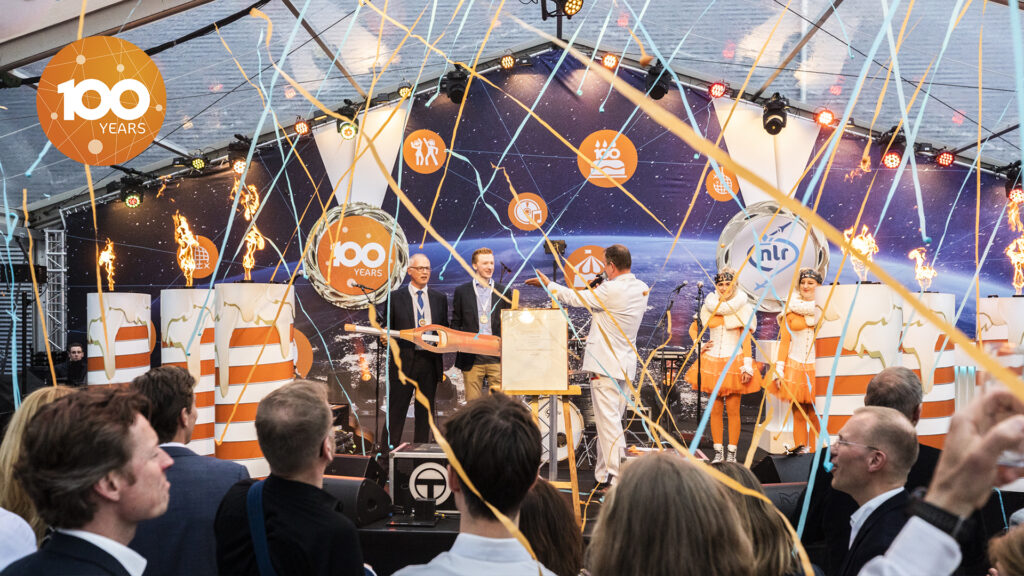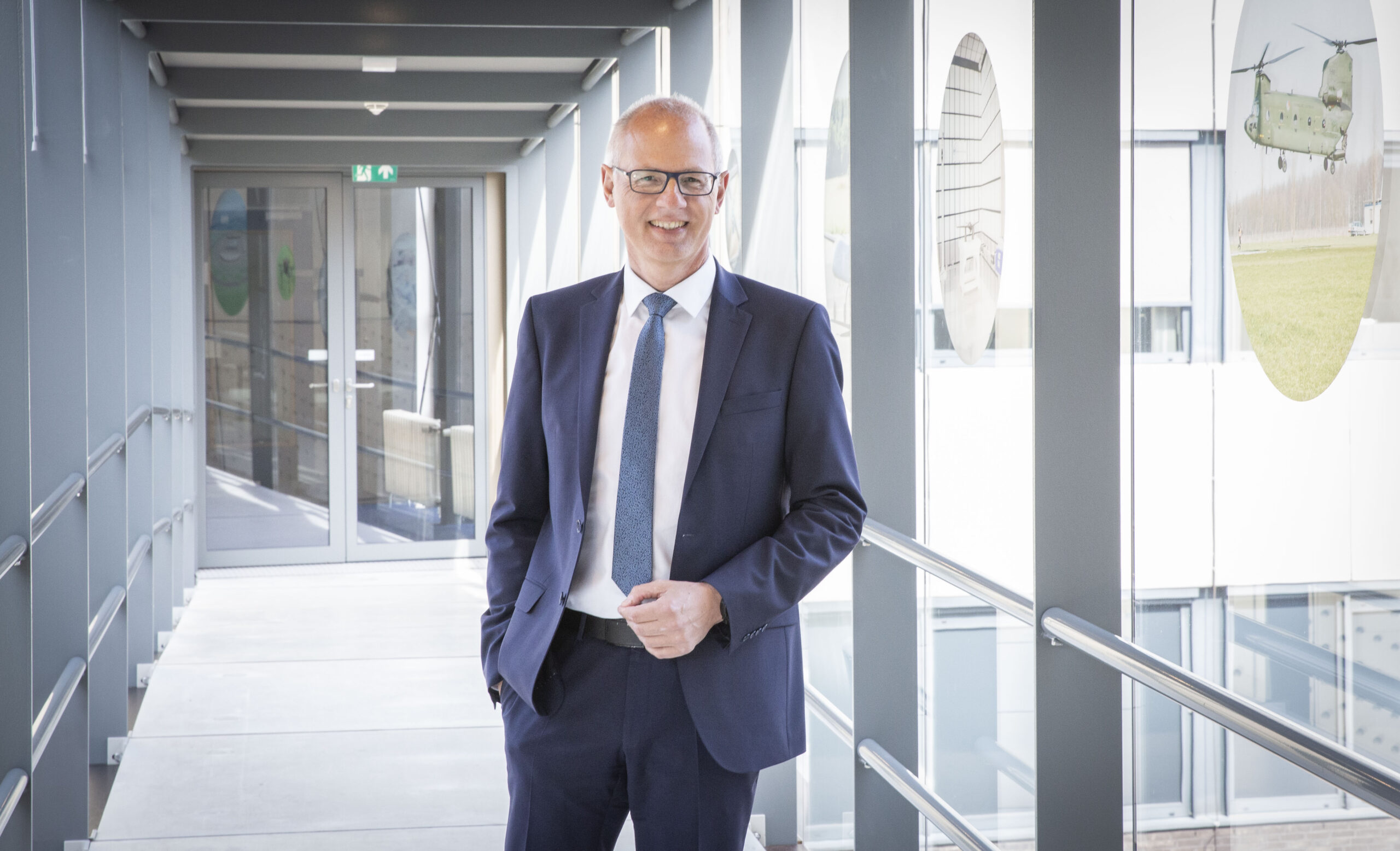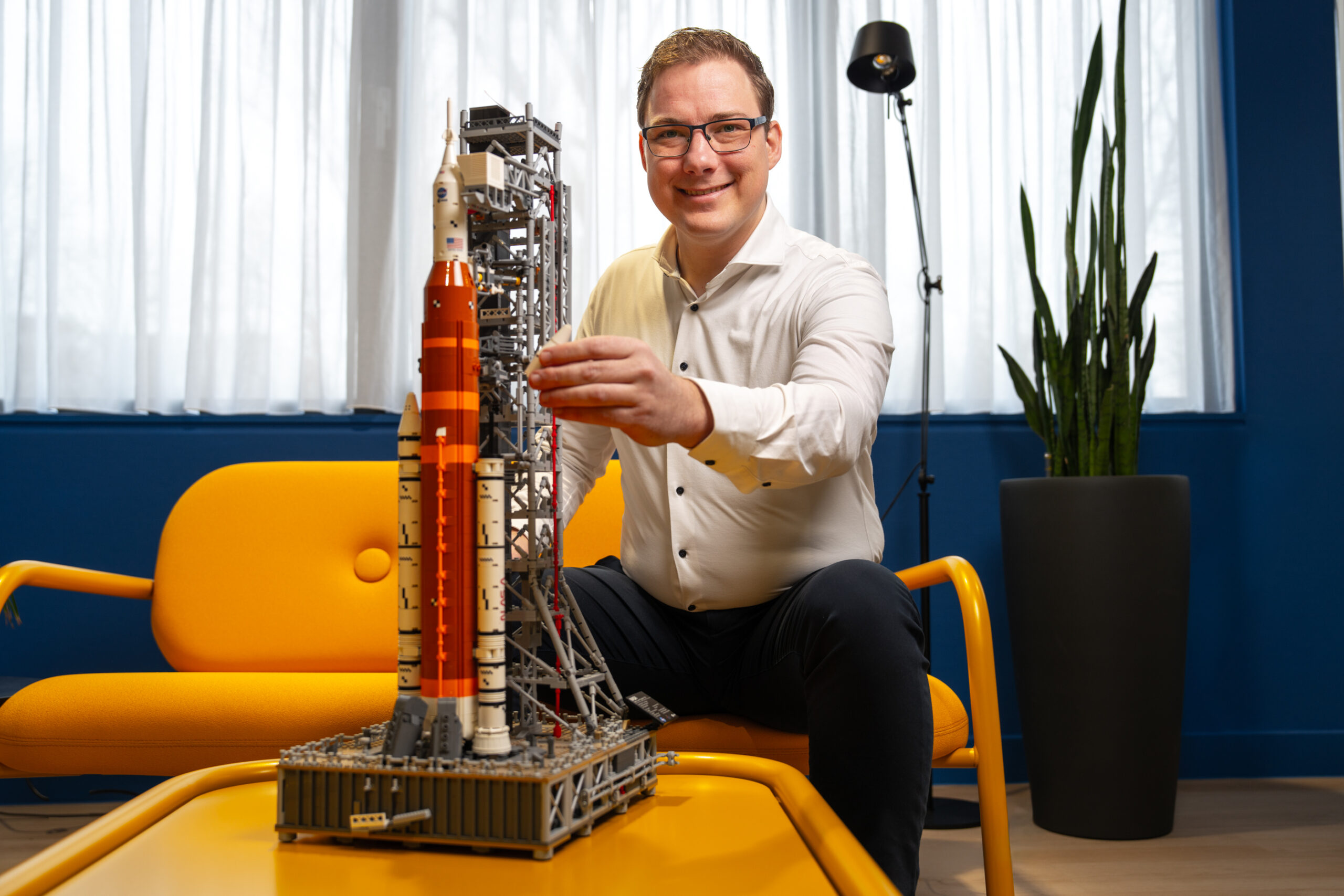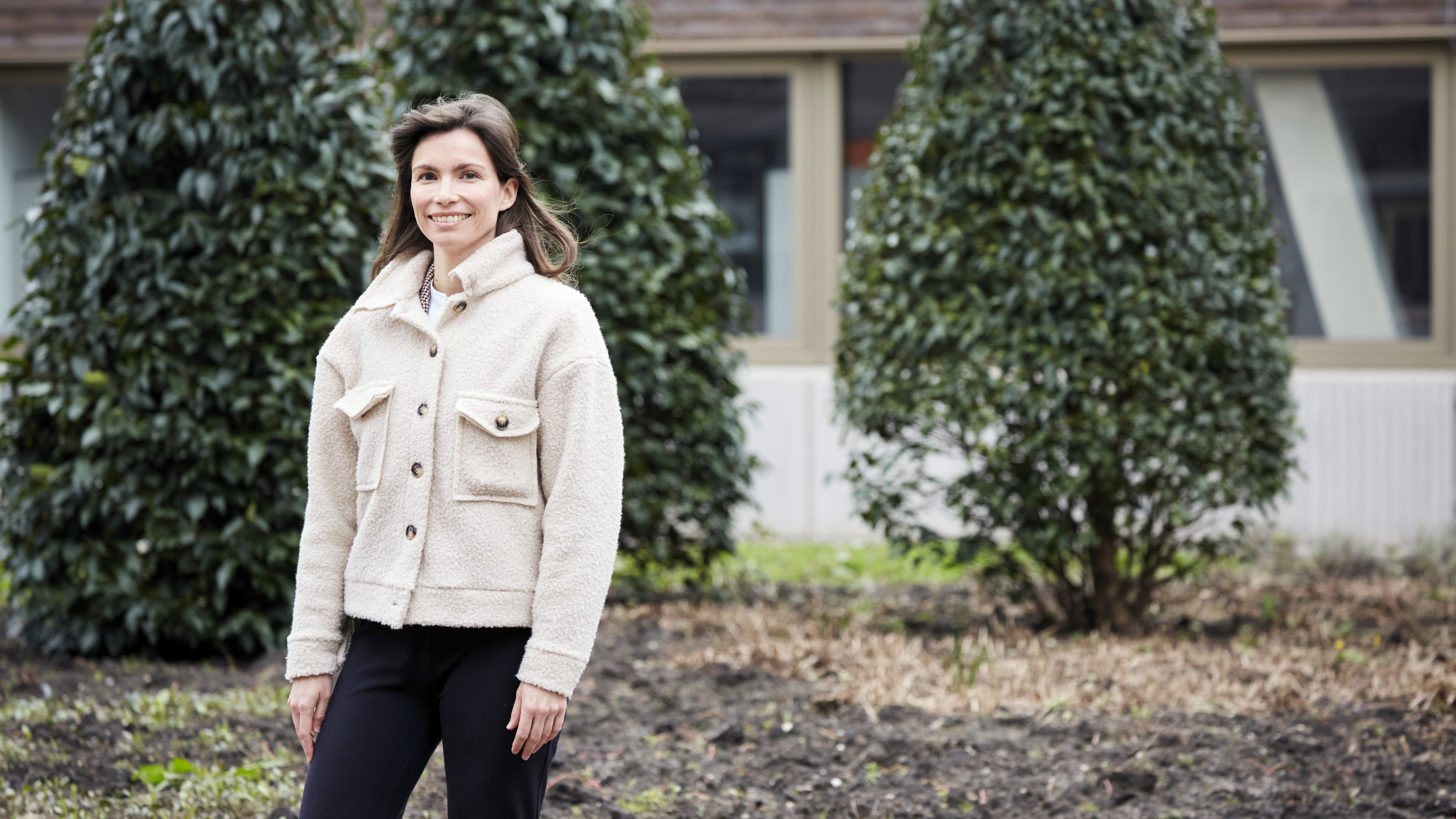His childhood dream was to become a fighter pilot. However, due to his fascination with technology, he chose to study Electrical and Electronics Engineering at TU Delft in 1983. After a brief stint at the Dutch airline Martinair, he spent his entire career working for NLR, becoming CEO in January 2010.
On 1 June 2025, he will pass the torch to a new Board after 15 years. In this special episode of ‘NLR People’, Michel looks back on his years as CEO of NLR, sharing the highlights and challenges he faced within the organisation, the sector, and personally, from his office in Amsterdam.
Just do it
What immediately stands out in Michel’s office are the miniatures and aircraft parts on the windowsill. For example, there’s a display unit – a kind of monitor with various meters – from the Fokker 100. “That was one of the first aircraft with those screens. I worked with it a lot during my time as a flight test engineer,” he says with pride.
Then he picks up a figurine of aircraft electronics he received when he left his position as division manager of the electronics department. The base reads: ‘don’t talk too much, just get on with it’. Michel: “That’s a characteristic of mine. You have to do research, but at some point, you also have to dare to make a decision. While taking steps, you must of course keep a close eye on what’s happening and adjust course if necessary,” he laughs.
Pushing the boundaries
If he had to describe his role in one word, he would say it’s “fascinating, in the broadest sense of the word”, without needing to think about it for long. “We do things here that are technically just not possible. Because if it were easy, it would already be in use.” As an applied research institute, NLR is at the forefront of innovation.
“We always push the boundaries and go a little beyond. That’s what makes the work unique.”
Various organisations, from aircraft manufacturers to the Ministry of Defence, work with NLR to test new products, systems, or materials. “Drones are often in the news now, and many people are overwhelmed by the possibilities. We did our first drone projects in 1982, when most people had hardly heard of these devices,” Michel explains. The same applies to sustainability. “Over the past decade, there has been a lot of attention to it, but we were already working on it long before that.”
Driving innovation
Developments always take place on a sliding scale, he emphasizes. “If you compare the fuel consumption of a current aircraft to that of the 1980s, it’s already significantly lower.” However, he also believes it’s good to apply pressure from time to time. “In order to meet the goals of the Paris Agreement, the aviation industry also needs to contribute. Such a deadline is necessary to push knowledge institutions and companies to take action. We need to do something. Standing on the sidelines and complaining is not my style.”
Michel believers his pragmatic approach was shaped by his time at Martinair: “It has helped me in this job that I have also gained experience in practice. You can think of many ways to improve aircraft maintenance from a research perspective, but I have actually stood next to a broken plane at Schiphol at 3 am. That teaches you a lot. Ultimately, it benefits technological development as well. You don’t innovate just for the sake of innovating, but to improve operations in practice.”
Ensuring a safe and secure society
NLR is involved in innovations in aerospace for both civil and military applications. For years, NLR has been an integrated partner of the Ministry of Defence, particularly the air force. “With our knowledge and expertise, we contribute to the effective and safe execution of Defence’s tasks,” says Michel. For example, NLR develops new training concepts and new, stronger materials for aircraft, or investigates improvements to equipment. In addition to technological innovations, NLR also looks at improving processes within Defence, such as maintaining equipment as efficiently as possible or improving deployability. “NLR has developed a robot that can inspect helicopter rotor blades, which was previously done by humans; someone would tap on a rotor blade and listen to the sound. If the sound changes, there is damage somewhere. This is, of course, very labour-intensive.”
The cooperation with Defence has only strengthened in recent years. “The geopolitical situation makes NLR’s assistance even more important,” says Peters. “In Ukraine, for example, we see that drones play a significant role. We are now focusing more on that. We are researching the most advanced drones and developing systems to counter the threat of drones.” Michel expects that, given the current situation, the cooperation between Defence and NLR will deepen further in the coming period.
“We remain a reliable strategic partner and support where and when needed.”
A seat at the table
NLR functions as a driver of innovation, and projects like Luchtvaart in Transitie (Aviation in Transition) are extremely important in this regard, according to Peters. This project was launched after a proposal led by NLR was submitted as part of the National Growth Fund. Industry stakeholders, including many SMEs, universities, and other parties, are working together to create a sustainable aviation sector. “It’s a double-edged sword,” he explains. “On the one hand, the Dutch aviation sector is making progress. And on top of that, with a national aviation program like this, we gain recognition from the European Commission and get a seat at the table.”
International business
European cooperation has been high on Michel’s agenda for the past fifteen years. “Aviation is, by definition, an international business. You can’t do it alone as a country; you need each other. The Dutch industry needs to be known to the large foreign parties. You can’t achieve that by just sitting behind your desk and only looking at Dutch research funding.
“If you look at the number of contracts awarded by the European Commission, NLR ranks second. We’re among the top.”
This applies not only to industry, but also to knowledge institutions in the field of aerospace, he believes. Other countries have similar knowledge institutes, such as Germany’s DLR and France’s ONERA. In a European context, these organisations regularly collaborate on various research projects. However, a place in such a consortium is not automatic. “You need to bring enough knowledge and expertise,” Michel explains. He continues proudly: “If you look at the number of contracts awarded by the European Commission, NLR ranks second. We’re among the top.”
More focus on space exploration
Just as there is collaboration within the EU on aviation, there has also been collaboration on space exploration for about ten years now. “In 2014, the EU – in addition to the existing activities of ESA – became interested in a program in the field of space exploration. NLR then set up an organisation with DLR and ONERA for research projects in the field of space exploration, and now there is also one focused on Defense,” he explains.
In recent years, NLR has built small satellites with various partners and launched them into space. Michel: “While DLR, for example, also works on large and complex satellites, we at NLR focus mainly on small satellites. This was partly out of necessity; building a large satellite takes a lot of time and money, which we simply didn’t have. But now we see that small satellites are much more powerful. The development time is shorter, which means you can respond faster and better address current questions.”
Overcoming economic crises
NLR made significant progress under Michel’s leadership, but it wasn’t always smooth sailing. Michel’s biggest challenge? “When I first took this position – in January 2010 – we had to make significant cuts due to the economic crisis. That was tough, I had to grow up quickly.”
And later – in 2020 – the coronavirus pandemic hit. “There was much personal distress, which really touched my heart,” he says, visibly moved. “People had to work from home as much as possible, but that wasn’t an option for everyone. Sometimes I would come to our office to be there for the people who worked here. I would walk through the building and it was so quiet, it was really unsettling.”
The mindset of the people
His face brightens up: “Fortunately, we came out of it well as a company. That was largely due to the flexibility of the people. The employees are one of the strengths of this organisation. They have a certain eagerness to solve problems. I’ve never worried about whether we’d be able to technically handle a task, that always works out. It’s expertise with a capital ‘E’.”

Never stop learning
A lot has also happened on a personal level over the past fifteen years. “My professor said at the end of my studies: ‘Michel, you’ve now graduated, but make sure you’re never done learning.’ I’ve taken that advice to heart. When a project is successful, we take it to the next level. If something doesn’t work out, we come up with an alternative. That’s how you keep growing.”
What’s he going to do now? “Enjoy myself, but definitely not sit still. I have a share in an airplane and I love flying. The plan is to log many flight hours in the coming months.” He’s also going to tick off a few destinations on his bucket list. “The first trip will be to the seventh continent, Antarctica.” Michel wants to remain involved in the aviation sector. “How that will take shape exactly, I’ll discover over the coming months. I find it very inspiring to be in touch with all sorts of people, both nationally and internationally, about the future of aviation and space exploration.”



